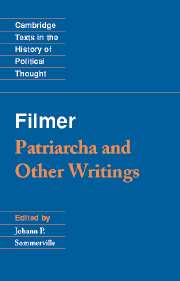Book contents
- Frontmatter
- Contents
- Preface
- Introduction
- Principal events in Filmer's life
- Bibliographical note
- The authorship and dating of some works attributed to Filmer
- A note on the text
- Abbreviations and sources
- Patriarcha
- The Free-holders Grand Inquest
- The Anarchy of a Limited or Mixed Monarchy
- The Necessity of the Absolute Power of all Kings
- Observations Concerning the Originall of Government, upon Mr Hobs ‘Leviathan’, Mr Milton against Salmasius, H. Grotius ‘De Jure Belli’
- Observations Upon Aristotles Politiques Touching Forms of Government, Together with Directions for Obedience to Governours in dangerous and doubtfull times
- Select biographical notes
- Textual notes
- Index
- Cambridge Texts in the History of Political Thought
The Anarchy of a Limited or Mixed Monarchy
Published online by Cambridge University Press: 05 June 2012
- Frontmatter
- Contents
- Preface
- Introduction
- Principal events in Filmer's life
- Bibliographical note
- The authorship and dating of some works attributed to Filmer
- A note on the text
- Abbreviations and sources
- Patriarcha
- The Free-holders Grand Inquest
- The Anarchy of a Limited or Mixed Monarchy
- The Necessity of the Absolute Power of all Kings
- Observations Concerning the Originall of Government, upon Mr Hobs ‘Leviathan’, Mr Milton against Salmasius, H. Grotius ‘De Jure Belli’
- Observations Upon Aristotles Politiques Touching Forms of Government, Together with Directions for Obedience to Governours in dangerous and doubtfull times
- Select biographical notes
- Textual notes
- Index
- Cambridge Texts in the History of Political Thought
Summary
THE ANARCHY OF A LIMITED OR MIXED MONARCHY OR,
A succinct Examination of the Fundamentals of Monarchy, both in this and other Kingdoms, as well about the Right of Power in Kings, as of the Originall or Naturall Liberty of the People.
A Question never yet disputed, though most necessary in these Times
Lucan Lib. 3.
Libertas (–) populi quem regna cohercent
Libertate perit: –
[Lucan Pharsaliaiii, 145–6: the liberty of a people which is subject to royal government is lost if they gain too great liberty]
– neque enim libertas gratior ulla est
Quam domino servire bono –
Claudian[Claudian, De Consulatu Stilichonisiii, 114–15: nor is there any more welcome liberty than to be subject to a good master).
THE PREFACE
We do but flatter ourselves, if we hope ever to be governed without an arbitrary power. No, we mistake. The question is not, whether there shall be an arbitrary power, but the only point is who shall have that arbitrary power, whether one man or many? There never was, nor *ever*304 can be any people governed without a power of making laws, and every power of making laws must be arbitrary. For to make a law according to law, is contradictio in adjecto [self-contradictory]. It is generally confessed that in a democracy the supreme or arbitrary power of making laws is in a multitude, and so in an aristocracy the like legislative or arbitrary power is in a few, or in the nobility.
- Type
- Chapter
- Information
- Filmer: 'Patriarcha' and Other Writings , pp. 131 - 171Publisher: Cambridge University PressPrint publication year: 1991
- 4
- Cited by



